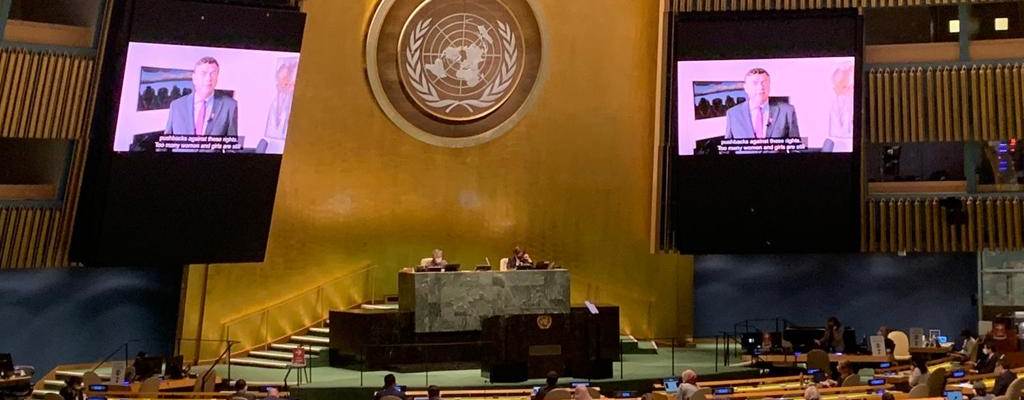President,
It is my pleasure to deliver this statement on behalf of the governments and peoples of 82 countries: Albania, Andorra, Antigua and Barbuda, Argentina, Australia, Austria, Belgium, Benin, Bosnia-Herzegovina, Bulgaria, Cabo Verde, Canada, Chile, Costa Rica, Cote d’Ivoire, Croatia, Cyprus, Czech Republic, Dominican Republic, Ecuador, El Salvador, Estonia, Fiji, Finland, France, Georgia, Germany, Greece, Guinea, Iceland, Ireland, Israel, Italy, Japan, Jordan, Kazakhstan, Kyrgyzstan, Latvia, Lebanon, Liberia, Liechtenstein, Lithuania, Luxembourg, Madagascar, Maldives, Malta, Marshall Islands, Mexico, Republic of Moldova, Monaco, Mongolia, Montenegro, Morocco, Namibia, Netherlands, New Zealand, North Macedonia, Norway, Palau, Peru, Portugal, Republic of Korea, Romania, Rwanda, Samoa, Serbia, Sierra Leone, Slovenia, South Africa, Spain, Sweden, Switzerland, Tajikistan, Thailand, Timor-Leste, Togo, Tunisia, Turkmenistan, Ukraine, United Kingdom, Uruguay, as well as my own country Denmark.
President, today, we celebrate the important progress in the advancement of gender equality and the realization of all human rights of all women and girls since the adoption of the Beijing Declaration and Platform for Action, in 1995, including in the areas of violence against women and girls, access to health services, including sexual and reproductive health and rights (SRHR), women’s and girls’ education and political and economic empowerment.
These improvements have been driven by dynamic feminist movements, women's rights organizations, and civil society. They are essential to guarantee the sustainability of the achievements as we continue to strive towards the Beijing commitments.
But twenty-five years of hard-fought gains are now seriously under threat by intensive pushbacks against these rights. Too many women and girls are still denied the right to make decisions about their own lives and are subject to sexual and gender-based violence, including harmful practices, with the tragic reality that one in three women worldwide will experience violence in her lifetime.
COVID-19 has dramatically aggravated this situation. Women and girls are being disproportionately impacted and face an extraordinary challenge. As a “shadow pandemic,” violence against women and girls grows as fast as the pandemic. Women and girls in vulnerable situations, including women and girls with disabilities, are most at risk. In the last twelve months, two hundred forty-three million women and girls aged fifteen to forty-nine years were subjected to sexual and/or physical violence by an intimate partner, and this figure will increase. This pandemic is also fuelling millions of additional cases of child, early and forced marriage. Curbing this requires concerted action to scale-up evidence-based prevention efforts to stop violence before it starts, address harmful social norms, ensure availability and accessibility of comprehensive services to all survivors, and hold perpetrators accountable to tackle impunity.
As regular primary health services are disrupted by the pandemic, women and adolescent girls have reduced access to vital health services, including maternity care and family planning. Gaps in SRHR and access to health services worldwide put women’s lives at risk and hamper gender equality, leaving eight hundred women dying in childbirth each day, twenty million women each year with some form of disability due to pregnancy- and childbirth-related complications, and two hundred fifteen million women with unmet needs for contraception. To be able to deploy their full potential and participate fully in economies and societies, women require access to comprehensive and non-discriminatory sexual and reproductive health services to enable them to make decisions, including if, when and how many children they want.
We call on all governments around the world to urgently invest in maintaining sexual and reproductive health services during the pandemic so that women and adolescent girls continue to have access to essential, life-saving health services.
President, the Decade of Action on the SDGs, the forthcoming Generation Equality Forum, spearheaded by the Governments of France and Mexico together with UN Women, and the current global response to COVID-19 present us with unprecedented converging opportunities to remobilize the international community, renew commitment and political will to make the societal changes dreamed of in Beijing and necessary to build back a more gender equal and inclusive world. Our governments commit to this objective and to champion women and girls’ human rights.
In closing, President, as no country has yet finished this agenda, we remain deeply committed to the accelerated full and effective implementation of the Beijing Declaration and Platform for Action and the ICPD Programme of Action and the outcomes of their review conferences. Women and men, girls and boys, must have the same power to shape society and their own lives. We will continue to work tirelessly to bridge the gap and bring gender equality in all dimensions of life, to fully empower women and girls and indeed empower humanity.
I thank you.
